
MENUMENU
TALK TO AN EXPERT
Special Hours: 7AM – 6PM PST
TALK TO AN EXPERT
Special Hours: 7AM – 6PM PST
It’s common knowledge that water and electricity don’t mix well, but what does that mean for batteries? Like most electronic devices, lithium batteries should NEVER be submerged in water. While most consumers would never face this scenario, many are curious just how much their batteries can resist water. With top-of-the-line LiFePO4 batteries, like Battle Born Batteries, extensive sealing, and IP65 ratings allow them to endure moist conditions. So, let’s take a closer look at what you need to know to answer the crucial question — can lithium batteries get wet?
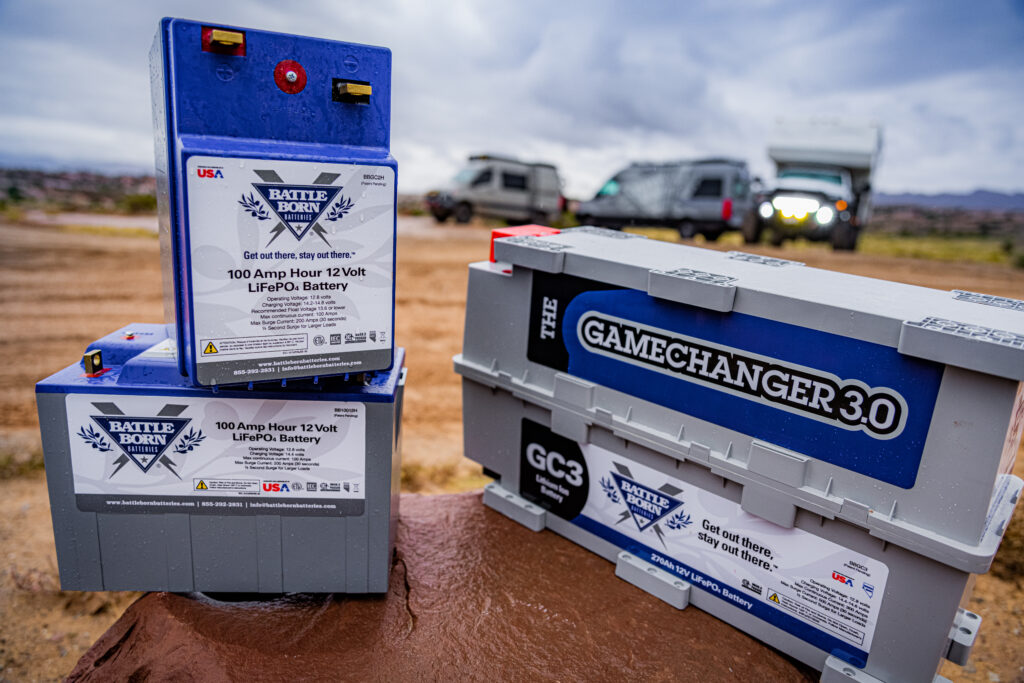
To fully understand how lithium batteries work, it is essential first to comprehend the critical differences between lithium and lead-acid batteries.
Lead-acid batteries operate using two lead plates, a positively charged cathode and a negatively charged anode, submerged in an electrolyte solution (typically sulfuric acid). When power is drawn from the fully charged battery, negatively charged sulfate ions move to its negative lead plate. This plate gives up its electrons and produces electricity.
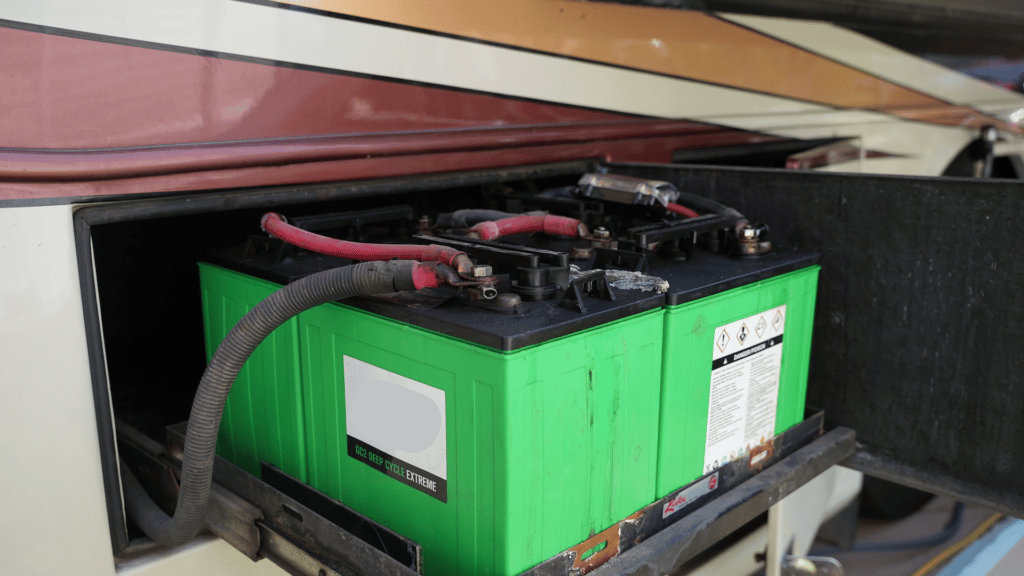
While charging, the process runs in reverse, as the sulfate ions regain their negative charge and return to the electrolyte solution.
Throughout the charging and discharging process, it’s crucial that the electrolyte solution maintains the correct balance of water and acid. This requires the owners of lead-acid batteries to regularly open their batteries and top them off with distilled water. Unfortunately, this creates tedious maintenance and forces the battery to be unsealed to allow access to its internal components. Consequently, the battery is left exposed to external elements and becomes more vulnerable when encountering less-than-ideal operating conditions.
In some ways, lithium batteries work on the same principles as lead acid batteries — a cathode, an anode, and an electrolyte solution. When energy is drawn from lithium batteries, lithium ions move across the electrolyte solution to the cathode, giving up their electron to produce electricity. As with lead acid, the process reverses when charging.
However, unlike lead-acid, lithium batteries are made entirely sealed. This allows the electrolyte solution to remain perfectly balanced throughout the battery’s life, with no maintenance or regular check-ins required. Having a sealed design keeps all internal elements safely inside the battery and prevents anything from getting in. Not only does this protect the batteries, but it also makes lithium batteries inherently safer than lead-acid ones.
The short answer is sometimes. This will depend on the quality of the battery and the manufacturer’s design. Battle Born Batteries are fully sealed and IP65 rated, making them water resistant and splash-proof, allowing them to continue to perform optimally, even in a somewhat moist environment. However, prolonged exposure to a high-moisture environment may cause water to penetrate the battery and cause irreversible damage.
When it comes to other types of lithium-ion batteries, it’s important to learn the manufacturer’s specifications regarding their water exposure. As previously noted, the majority of lithium batteries are sealed cells, meaning they have some inherent protection from water.
However, not all seals are created equal. Depending on the manufacturer, the amount and duration of water exposure can drastically impact battery health. Generally, most lithium batteries can withstand some rain or accidental splashing, but depending on the recommendations of your battery’s manufacturer, it may be beneficial to take further precautions against water exposure.
Although different types of lithium batteries offer varying degrees of water resistance, they should never be submerged in water. Submerging any battery in water may significantly damage it. Water that infiltrates lithium batteries can reduce performance or even render the battery inoperable.
Therefore, although it’s always important to protect your batteries from excessive water exposure, Battle Born Batteries can endure some moisture and still function optimally.
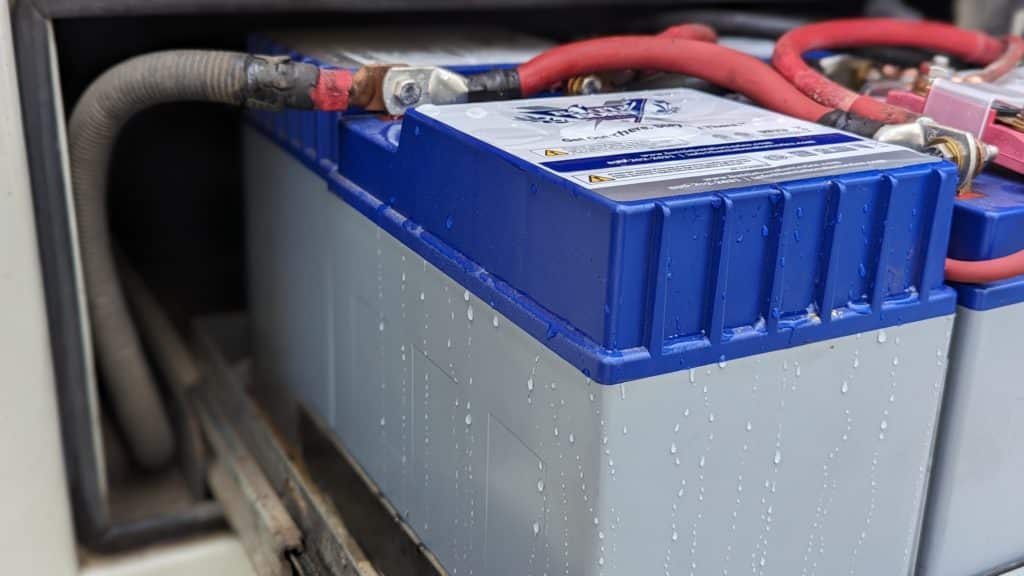
Depending on the quantity and duration of water exposure, the answer is usually (and hopefully) nothing! Once again, the sealed design of Battle Born Batteries lithium batteries triumphs against occasional water exposure, keeping the critical parts of the battery safe from harm.
However, extended exposure can lead to damage, particularly to sensitive components like the battery terminals. More serious issues can result if water reaches the internal elements of the battery, causing potentially dangerous chemical reactions.
If a lithium battery is submerged in water, current will be able to flow in the water between the terminals. This will cause the battery to discharge unintentionally and could potentially damage it.
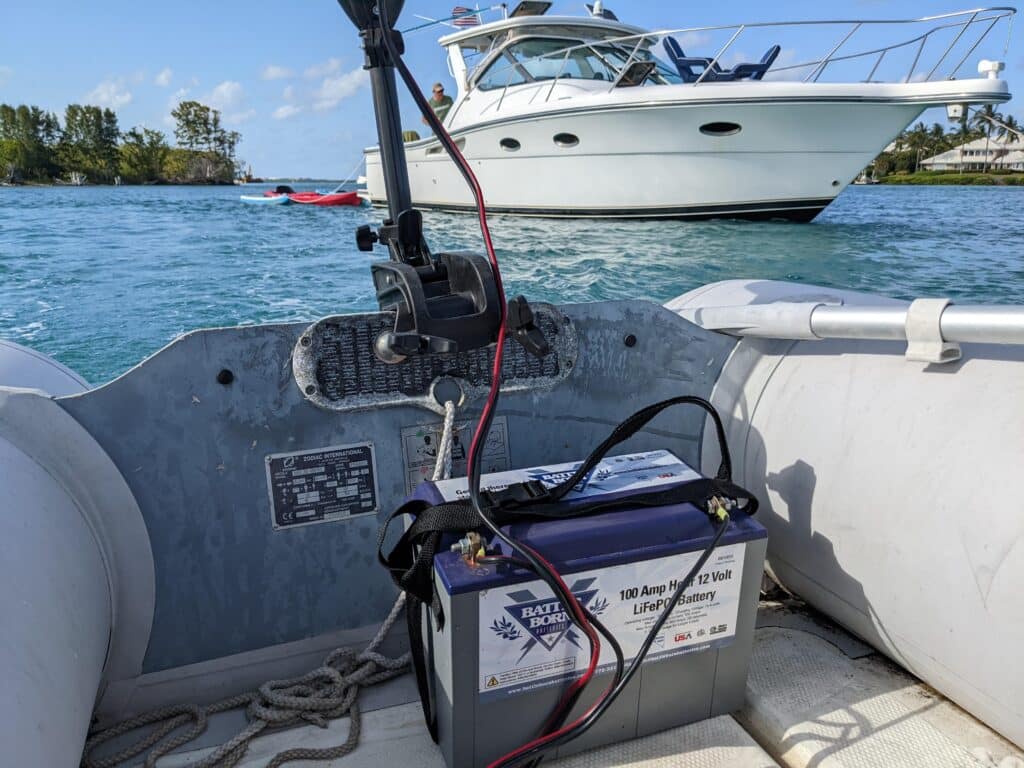
Not all water impacts batteries in the same way. Batteries exposed to salt water will suffer more damage and degraded performance than batteries exposed to similar amounts of fresh water.
The presence of dissolved salt in the water not only corrodes battery components and cables, but salt water is also more electrically conductive than fresh water. This means that when salt water encounters the battery terminals, the battery can begin discharging unintentionally.
While it is always best for your battery to remain dry, if it encounters minimal amounts of water or a moderately moist environment, recharging it should not be a problem. On the other hand, if the battery is sitting in water or submerged, never attempt to apply a charge. If you believe water has damaged your lithium battery, you should not attempt to recharge it. Instead, safely dispose of it.
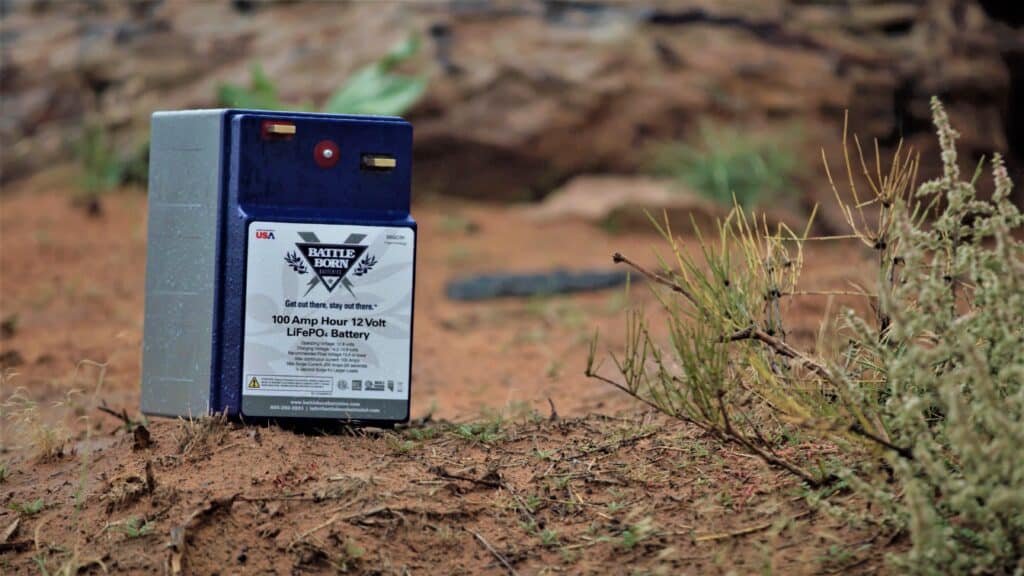
Since lithium batteries are completely sealed and none of their internal components are exposed, there’s no inherent danger in leaving them outside. Additionally, LiFePO4 batteries can operate in a wide range of high and low temperatures, allowing them to continue operating in varying weather conditions. With these things considered, leaving your lithium batteries outside from time to time should not damage them.
However, leaving lithium batteries exposed to the elements for an extended period of time should be avoided. To extend the life of your batteries, it is essential to protect them from rain, wind, water, and extreme temperatures. This will ensure your batteries can continue operating optimally and save you money and hassle in the long run. After all, when you invest time and money into your batteries, you want them to last as long as possible.
While some water won’t harm your batteries, taking basic precautions to keep them dry will minimize issues from water damage.
If possible, install your battery in a covered location shielded from water. Garages, storage bays, internal cabinets, and other enclosed spaces are great options for battery placement. Otherwise, a waterproof battery box or compartment can also provide adequate protection when you’re not dealing with extreme water exposure.
It may sound simple, but simply being aware of excess water exposure when using your sailboat, marine vessels, or other off-grid vehicles during heavy rain or other extreme precipitation can go a long way in keeping your batteries dry.
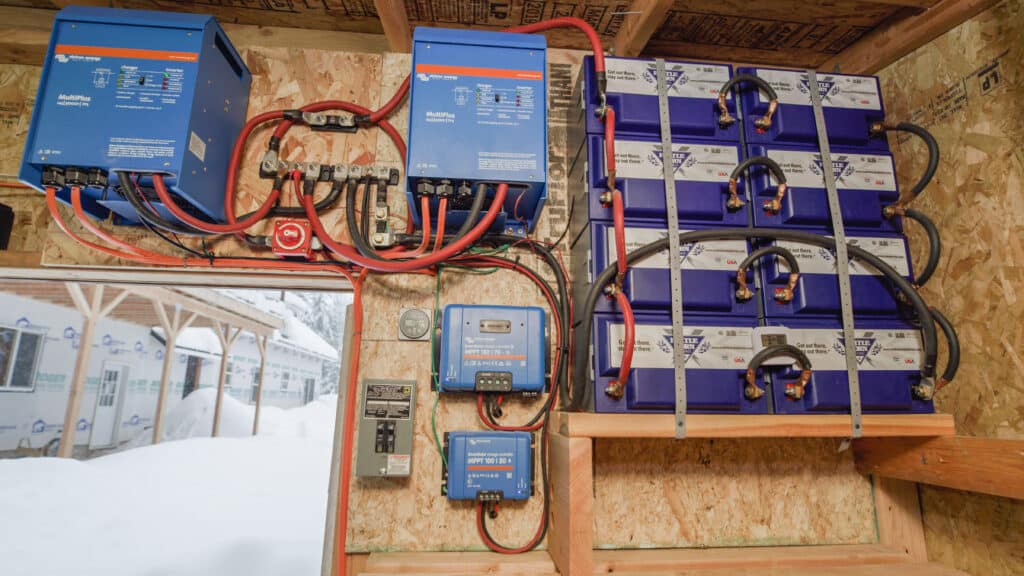
In order to ensure that Battle Born Batteries are protected from the elements, we put them through stringent testing protocols. These tests expose the batteries to test how resistant they are to water exposure and outside particles.
To rate the quality of enclosures around electronic and other devices, “Ingress Protection” (IP) ratings were created. These standards are used to signal the effectiveness of sealing on electronic devices to protect against foreign objects and moisture. IP ratings are based on a two-digit scale. The first digit represents intrusion protection, rated on a scale from 0-6 based on the ability to resist foreign bodies. This is followed by a second digit that represents moisture protection, rated on a scale from 0-9.
Our 100Ah 12V, GC2, GC3, and 8D Battle Born Batteries have received a rating of IP65. The 6 rating shows that the enclosure on our batteries is “totally dust tight” and fully protected against other particulates. Then, the five represents water resistance, tested by protection against low-pressure water jets of 6.3mm directed from any angle.
The IP65 rating means that our batteries are water-resistant. When operating in moderately moist environments or exposed to small amounts of water, they are secure and fully protected. These moderate levels of water are unable to penetrate the protective sealing on each of our batteries.
If you anticipate your lithium batteries will regularly be exposed to extensive moisture, you can also waterproof them. In addition, to secure, dry-box-style battery compartments, batteries can be tightly wrapped or coated in waterproof materials, such as urethane waterproof coatings, silicone, or rubberized paints. These materials can offer an additional layer of protection for your lithium battery as long as the terminals and other critical parts of the battery remain exposed and usable.
Pro Tip: Ice fishermen build battery boxes to keep their batteries warm and dry. These enclosed containers keep the battery safe from water or other hazards during transport. Typically, the box has ports allowing the user to draw power and charge the battery without having to remove it. These boxes give ice fishermen piece of mind no matter what extreme conditions they encounter.
Under normal circumstances and with basic care, lithium marine batteries are extremely safe to use on the water. In fact, they’re the top option for those who need marine batteries with extensive storage, quick charging, and the ability to operate in nearly any condition. Compared to lead-acid batteries, lithium batteries offer more flexible mounting options and less risk of hazard if rough seas are encountered.
As we’ve discussed, lithium batteries are completely sealed and have a lower risk of water-related damage or issues. While some lithium battery chemistries are more volatile and susceptible to thermal runaway, lithium-iron phosphate (LiFePO4) is extremely safe and stable. With Battle Born Batteries powering your marine or sailing vessel, you can rest assured that you have the safest power available.
Can lithium batteries get wet? The answer is yes! Battle Born Batteries are IP65 rated, making them splashproof and water resistant. Thanks to their sealed design, they can withstand direct encounters with water without suffering any severe or lasting damage.
While extended water exposure can be detrimental, taking the proper precautions will ensure your batteries remain fully operational. With superior performance, unmatched quality, and exceptional safety ratings, Battle Born LiFePO4 batteries remain the top choice for marine use.
We know that building or upgrading an electrical system can be overwhelming, so we’re here to help. Our Reno, Nevada-based sales and customer service team is standing by at (855) 292-2831 to take your questions!
Also, join us on Facebook, Instagram, and YouTube to learn more about how lithium battery systems can power your lifestyle, see how others have built their systems, and gain the confidence to get out there and stay out there.
Shop Best Sellers








Ask a technical specialist now at 855.292.2831
Stay in the Know